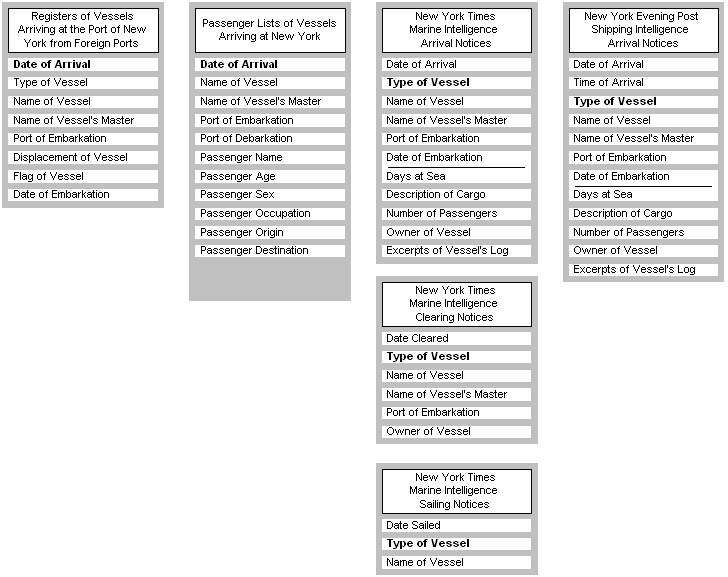Research Methodology
I was fortunate when I began my interest in genealogy, because I already knew the date that my great great grandparents arrived in New York. I was able to go straight to the Passenger Lists of Vessels Arriving at New York to confirm this fact. However, since expanding my scope to include all voyages of the William Frothingham, I have used a different approach that involves researching a variety of information sources. Figure 1 shows some of the sources I referenced to gather the information I have presented on these pages.

Figure 1. Sources used to research the William Frothingham. Each gray block represents a different source of information. The name of the source appears at the top of each gray block. The data contained in that source appear below the name. Boldfaced data indicates the key that the entries are sorted on, e.g. arrival notices in the New York Times are sorted by vessel type.
Registers of Vessels Arriving at the Port of New York from Foreign Ports provide a rapid way to amass all the arrival dates for the William Frothingham. These arrival dates are a crucial launching point for further information.
With the arrival dates in hand, I consulted the ship arrival notices in the New York Times and New York Evening Post. These notices provide the name of the captain, the port of embarkation, either the date of embarkation or else the number of days the ship has been at sea, the cargo and number of passengers transported, and the ship's owners. Frequently, these notices also provide highlights of the voyage from the ship's log and in some cases they associate the date and her position at sea with these events. I found it important to consult both newspapers because in some cases a highlight of the voyage appeared in one newspaper and not the other. Also, the Evening Post divided its shipping information into two parts, those events that occurred before noon and those after noon.
Passenger Lists of Vessels Arriving at New York provide information about each passenger, specifically their name, age, sex, occupation, country of origin, country in which they intend to become inhabitants, whether or not they died on the voyage, and part of ship occupied during the voyage.
| Chronology | Passengers | Ship Description | Crew | Builder | Owners | Maps | Gems |
| Contacts | Links | Research Methodology | Research Log | Glossary | Bibliography |
| Home |
Frothingham@Zurita.com
